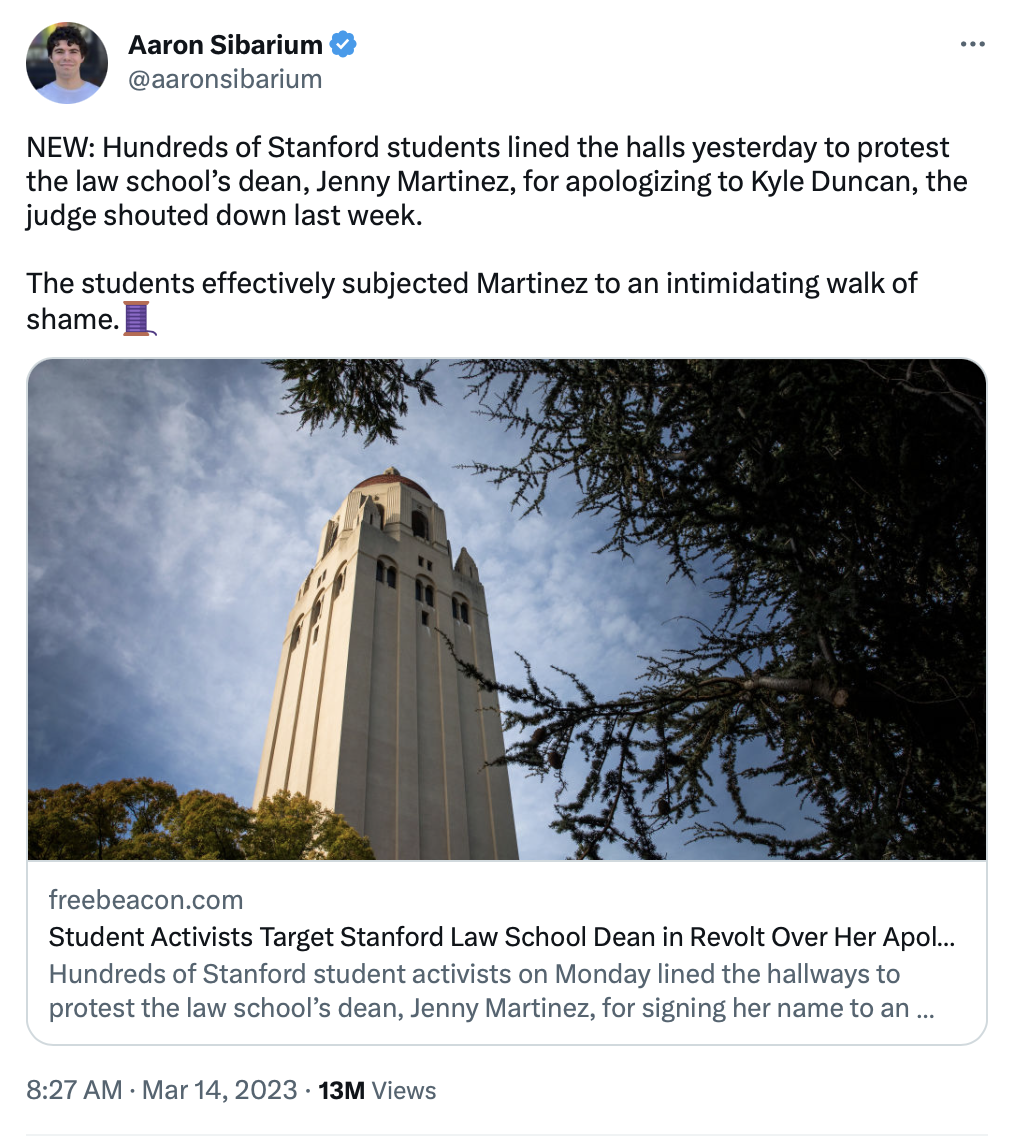FIRE’s letter to Stanford Law School, based on behavior as bad as what we saw last year at Yale Law School and see here.
Dear President Tessier-Lavigne:
FIRE is once again deeply concerned about the state of free expression at Stanford University after a student-organized Stanford Law School speech by U.S. Circuit Judge Stuart Kyle Duncan was disrupted last night,2 with at least one report that his remarks ended some 40 minutes earlier than planned as a result. The apparently successful exercise of the heckler’s veto by attendees determined to disrupt Judge Duncan’s remarks, at a Federalist Society- sponsored event, is troubling enough. But FIRE must also express our deep concern regarding Associate Dean for Diversity, Equity, and Inclusion Tirien Steinbach’s temporary removal of Duncan from the podium—against his wishes—to offer commentary appearing to promote censorship. Dean Steinbach pinballs between praising free speech, accusing Judge Duncan of “harm,” and asking him if what he has to say is important enough to justify upsetting students. She ultimately suggests Stanford may wish to consider abandoning its free expression commitments altogether to prevent the “harm” allegedly inherent in hearing views with which one may disagree in the future . . .
[added March 11, 9pm CT]
Stanford issues a not-very-serious apology to Judge Duncan. Obvious step #1 would be to fire the DEI representative of Stanford. It is my suspicion that this is the kind of behavior that DEI departments promote, totally in line with what occurred at Judge Duncan’s lecture. How about looking into that? How about suspending/expelling numerous law students?
[added March 12, 4pm CT]
Stanford cannot absolve itself of this problem by sacrificing Steinbach as a scapegoat. (To be clear, I suspect Steinbach will be quietly reassigned in six months after things quiet down with a nice settlement offer.) Rather, Stanford created this problem by establishing, reinforcing, and growing the DEI bureaucracy.
When a university empowers DEI to deem speech “harmful,” DEI will deem speech “harmful.” When a university empowers DEI to designate spaces as “safe,” DEI will deem spaces as “safe.” When a university allows DEI to treat some people as “oppressors,” DEI will treat those people as “oppressors.” When a university teaches students that “harmful” speech has no place on a campus, the students will take steps to prevent “harmful” speech on their campus. This protest was a direct byproduct of what students have learned for years.
Every word in Steinbach’s speech reinforces these core planks of DEI. And her speech was obviously prepared in advance. She was so confident in her beliefs that she delivered those remarks, knowing she would be recorded. Steinbach no doubt thought she was on the right side of the university. Did Dean Martinez approve this conduct in advance? Or did Steinbach thinks she did not need to run her tirade by the Dean first? In either case, we have witnessed the endgame of DEI. These officials are empowered to extend their tendrils into every facet of an academic institution, with or without the backing of the Dean. Their mission is not to promote learning or academic inquiry, but instead to advance a specific ideology, which I refer to as DEIdeology. These beliefs are not trying to achieve a goal of neutrality. Rather, consistent with anti-racist teachings, they seek to use their newly-acquired power to elevate preferred messages and to deplatform “harmful” speech.
[Added March 13, 12:30 am CT]
More self-inflicted wounds by Stanford Law School, including the admonition that students shouldn’t go online to report what actually happened. Excerpt from the Washington Free Beacon:
Hours after Stanford University apologized to Fifth Circuit appellate judge Kyle Duncan for the disruption of his talk last week, administrators encouraged members of the law school’s Federalist Society chapter, which sponsored Duncan’s visit, to “reach out” to the same administrators—including the diversity dean—who aided and abetted the melee.
Leaders of the Stanford Federalist Society received an email Saturday night from acting associate dean of students Jeanne Merino, who stood by silently as students disrupted Duncan’s talk. Merino pointed them to “resources that you can use right now to support your safety and mental health”—and discouraged them from tweeting about the event “until this news cycle winds down.”
Among the resources Merino to which pointed them was Associate Dean of Diversity, Equity, and Inclusion Tirien Steinbach, who took the podium from Duncan to talk about the “harm” he’d caused—and whom Stanford condemned in its apology to Duncan, characterizing Steinbach’s intervention as “inappropriate.”
In addition to Steinbach, Merino listed herself, Associate Director of Student Affairs Holly Parrish, and Student Affairs Program Coordinator Megan Brown as possible sources of “support.” All three watched in silence as protesters accosted Duncan and berated their peers for inviting him.
Merino went on to discourage the Federalist Society from tweeting about the disruption “until this news cycle winds down,” stating that “trolls are looking for a fight.” That warning came after Stanford endured a brutal 24 hours on social media, with numerous lawyers—including Duncan himself—calling for Steinbach to be fired and the protesters punished.”
“The student protesters, who formed a human corridor from Martinez’s classroom to the building’s exit, comprised nearly a third of the law school. And the majority of Martinez’s class—approximately 50 students out of the 60 enrolled—participated in the protest themselves….
Martinez arrived to the classroom where she teaches constitutional law to find a whiteboard covered in fliers attacking Duncan and defending those who disrupted him. The fliers parroted the argument, made by student activists, that the heckler’s veto is a form of free speech.
“It was eerie,” the student said. “The protesters were silent, staring from behind their masks at everyone who chose not to protest, including the dean.”
Ironically, the student added, “this form of protest would have been completely fine” at Duncan’s talk on Thursday.”


